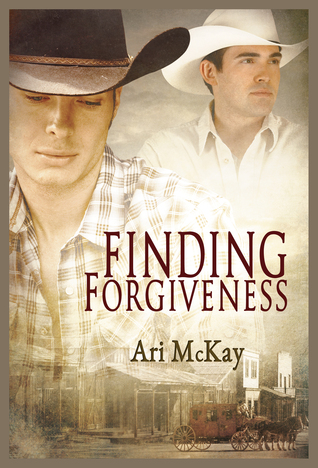FINDING FORGIVENESS
Ari McKay
Blurb: Boston in 1888 is quite urbane, but
unfortunately for Gil Porter, that isn’t the same thing as being understanding.
When his sexuality is exposed by the scandalous suicide of his lover, Gil is
exiled to the small town of Mercy, Texas, by his domineering father, George,
who believes life on Vernon Porter's ranch will cure Gil of his “unnatural”
desires. Grieving and ashamed, Gil is determined to keep his distance from
everyone until he can return home. To his surprise, he finds acceptance at Bent
Oak Ranch, especially from Matt Grayson, the handsome son of the ranch foreman.
Knowing he must fight his attraction to Matt, Gil courts a local girl, but an
unexpected encounter with Matt leads to his discovery of Matt’s feelings for
him. Torn between Matt and his desire to be “normal," between returning to
his old life and building a new one in Texas, Gil is faced with a
choice—appeasing his father or becoming the man Matt knows he can be.
This is what you call a
period piece in historical fiction. The
atmosphere of the time and place is what’s important, not the actual historical
accuracy. Even so, with some minor
details, I’d say this charming and very gratifying story will provide plenty of
warm fuzzies for the reader.
Two things stand out as not
being my historical cup of tea. One is
that there seem to be a lot of gay men in 1888 Mercy, Texas, who though not out
and proud have managed to gain acceptance from a broad number of people. The ranch owner is gay, the ranch foreman’s
son is gay, the ranch owner’s nephew is gay, and, [SPOILER] the ranch foreman
is, as I suspected all along, gay. Oh
and one of the hands, too. This is
hardly impossible, but you’d think someone on the ranch would suspect,
especially when Gil’s father shows up and starts screaming about his son’s
“unnatural” desires. The worst I would
call this is sloppy, but it’s with good intent.
The other thing is that at
one point early in the novel Matt tells Gil that the Bent Oak Ranch has 150
ranch hands. Where do they put them
all? How do they feed them all? They explain the bunk house is a bit off from
the main house and complex, but it must be the size of a Motel 6, and the ranch
hands carefully stay away from the rest of the ranch as they never seem to show
up and ask questions or for a drink of water or anything. Yes, a few do make their appearance from time
to time, but I have this image of dozens of ranch hands
wandering about the corral, gathering in small groups to gossip or drink or eye
the daughter of the house or at least try to lasso something. Some of the ranch hands are of Hispanic
descent and it’s nice to see that at least in one pocket of 1888 Texas society
Mexicans are fully accepted and integrated.
What this points out more
than anything is that there are historical novelists and then there are
historical novelists. Some track down
every little detail, as I do, and others just want their readers to sit back
and enjoy the story. This is clearly the
latter. I am the sort of historical
novelist this book is not intended for.
Oh, and I don't understand the title. I guess everyone in the story needed forgiveness from everyone else, but it did not seem especially compelling.















No comments:
Post a Comment